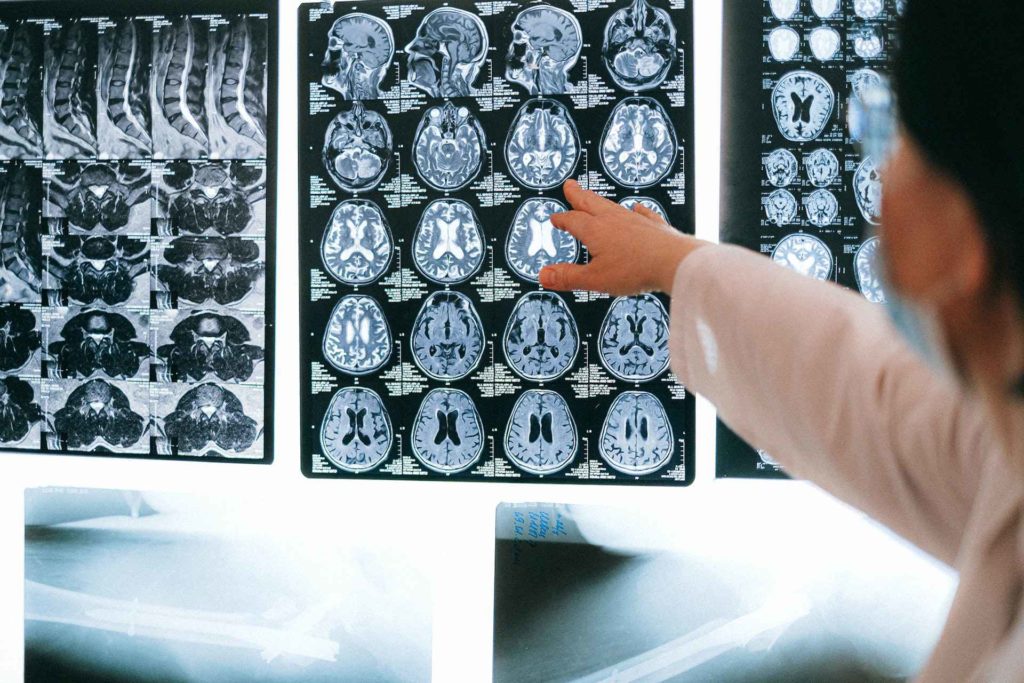A mild traumatic brain injury (TBI) called concussion affects millions of people in the US. A bump or jolt to the head that jostles the brain can cause trauma. The trauma can lead to physical and chemical changes in the brain, sometimes damaging brain cells.
A concussion is a common injury among those participating in contact sports. But it also occurs in motor vehicle accidents across the country. Data from the National Library of Medicine revealed concussions occur in about one out of 61 occupants in tow-away crashes.
If you or a loved one sustains a head injury after a car accident, it is best to seek a car accident lawyer. Law firms usually offer free consultations for personal injury cases and can help you build a claim for fair compensation.
Key Takeaways
|
What is a concussion?
The term concussion originated from the Latin word “concutere,” which means “to shake violently.” It is traumatic brain injury (TBI) resulting from an impact that causes the head to move back and forth forcefully.
Concussions are particularly dangerous as the brain is soft tissue suspended in cerebrospinal fluid. The skull protects the brain from external forces, but a sudden impact can cause the brain to slam against it. Forceful contact of the brain with the skull can cause damage to the blood vessels, bruising, and nerve injury.
There are three grades of concussions, depending on the consequences. They are mild, moderate, and severe.
Mild concussions entail no loss of consciousness, with symptoms that last less than 15 minutes. Moderate concussions involve no loss of consciousness, but symptoms last more than 15 minutes. On the other hand, severe concussions lead people to lose consciousness after an incident.
Another category for a concussion depends on the site of the brain injury. These are coup, contrecoup, and coup-contrecoup.
A coup is an injury that occurs on the side of the brain that received the blow. For instance, if your head hits a solid object on the right side, the injury is on the right side of the brain.
On the other hand, a contrecoup injury is on the opposite side of the impact site. In that case, a blow on the right side results in injury to the left side of the brain.
A coup-contrecoup is when the brain sustains a serious injury on two sides. A coup-contrecoup injury often happens in a rear-end car crash when the body slams forward and back. In this instance, the head doesn’t need to come into physical contact with any object. The car’s movement alone provides the coup-contrecoup force, resulting in brain damage.
Types of concussions
A person can sustain six major types of concussions after an auto accident. These are cognitive, vestibular, ocular, post-traumatic headache, cervical, and anxiety.
- Cognitive concussions cause people to struggle with complex or prolonged mental tasks and subject matters. Sometimes, it can lead to increased fatigue, especially on stressful days. Cognitive issues include increased distractibility, decreased multitasking skills, reduced ability to learn and retain new information, and less concentration.
- Vestibular concussions cause challenges with motion, balance, and vision. It impairs the ability to interpret actions, steady or balance vision during movement, and maintain good hand-and-eye coordination.
- Ocular concussions affect visual tasks, including watching a computer or cellphone screen and reading long passages. It also influences tandem eye movements, which makes it challenging to bring eyes together or track motion.
- Post-traumatic headaches have a pulsating quality that gets worse with activity. They present symptoms similar to migraines, including nausea, dizziness, poor concentration, vomiting, insomnia, sensitivity to noise and light, and fatigue. It may also lead to personality changes like anxiety or depression.
- Cervical concussions cause trouble with pressure or stress on the spine, spinal cord, or even on the neck. A victim carrying a heavy backpack or slouching while on the computer worsens symptoms, such as headaches.
- Anxiety or mood concussions make it challenging to clear your thoughts and can sometimes cause feelings of depression. It causes problems with social interactions and may worsen if the person avoids routine activities.
How to know if you have a concussion
In most cases, it’s easy to spot an injury after a vehicle accident. But many injuries go unnoticed, especially if you don’t know where to look. For concussions, each case is different, depending on how a person sustained them.
Sometimes, victims who suffer from concussions may not notice symptoms of the injury and feel “quite right.” Because of this phenomenon, the Centers for Disease Control and Prevention (CDC) categorized proper concussion diagnostics into “observed” and “reported” symptoms.
Observed concussion symptoms include:
- Moving clumsily
- Appearing stunned or dazed
- Briefly losing consciousness
- Unusual changes in mood, behavior, or personality
- Losing memories before or after the event which caused the injury
Reported concussion symptoms include:
- Confusion
- Vision issues
- Vomiting or nausea
- Sensitivity to noise or light
- Dizziness and balance problems
- Tension headaches
- Issues with concentration or memory
Watch out for universal signs of a concussion after experiencing trauma. It is crucial to be alert for symptoms as some signs may not appear for hours or days. Moreover, they may be difficult to distinguish because they are similar to other health problems.
Concussion symptoms include four main types: physical, cognitive, sleep, and emotional.
- Physical symptoms include sensitivity to light or noise, dizziness or balance problems, and light-headedness. In addition, concussions can manifest through headaches, vomiting, and nausea. Vision problems, like unusual pupil dilation and blurry vision, can also occur after a trauma.
- Cognitive manifestations of symptoms include concentration or attention problems, short- or long-term memory issues, and difficulties in thinking clearly. Other signs include struggling with multitasking and completing mental tasks.
- Sleep symptoms include irregular or drastic changes in sleep patterns and difficulties falling asleep.
- Emotional symptoms include anxiety, irritability, anger, panic attacks, and depression.
Delayed concussions
Concussion symptoms generally improve within a few weeks. People go back to work, assuming they have recovered fully.
However, delayed concussions are brain injuries that take a while before manifesting symptoms. They affect a person’s daily routine, making it difficult to concentrate, work for prolonged periods, etc.
Signs of delayed concussions usually worsen as the damage affects a person’s mental functions. In some cases, it can last for a year or more. These are similar to regular concussions with the following symptoms:
- Dizziness
- Emotional instability
- Headaches and nausea
- Sensitivity to light and noise
- Cognitive difficulties or brain fog
- Concentration and memory problems
- Ringing in the ears
Failing to get medical attention immediately after head trauma can result in failing to diagnose a concussion. The problem is a person with a history of concussions is likely to be more vulnerable to TBI. For instance, minor injuries that should not be serious can result in concussions for someone who has had them before.
How do I avoid a concussion in a car accident?
Prevention is better than treatment in any situation. Drivers and other people on the road can mitigate the chances of injuries by exercising proper caution. Defensive driving practices can help, such as the following:
- Keeping a safe distance from other vehicles.
- Avoiding distractions.
- Not relying entirely on car indicators.
- Wearing your seatbelts.
A National Highway Traffic Safety Administration report revealed that 51 percent of the 23,824 passengers who died in 2020 were not wearing seatbelts. Buckling up keeps vehicle occupants less likely to be ejected from a car in a crash. Seatbelts can also prevent users from hitting their heads on the steering wheel, window, dashboard, or another solid object.
Airbags can reduce the severity of injuries, but they are not enough to protect passengers. They are most effective when used in conjunction with seat belts. In fact, the explosive force of a deploying airbag can be dangerous or even fatal to people not wearing seatbelts. Wearing seat belts can reduce the risk of sustaining moderate to critical injuries by half.
Things To Do if You Sustained a Concussion in a Car Accident


Sustaining a concussion after a car accident can be a traumatic experience, regardless of whether you were at fault. Feelings of helplessness are common, especially if you did everything to be safe but could not prevent the collision.
However, immediately addressing any injury from a car accident is crucial when trying to recover damages. Medical costs are the most significant factor in calculating personal injury damages. Thus, it is essential to seek medical care as early as possible.
Additionally, documenting everything will avoid pitfalls when negotiating with
Obtain and keep track of official reports
Make sure to track all documentation regarding your accident. It includes getting a copy of police reports,
Law enforcement officers that arrive at the car accident scene write up the police report. It includes relevant details of the crash, statements from the drivers involved, and from witnesses.
When a victim files a claim to
Keep a written record of events
Write an account of what happened during and after the accident while your memories remain fresh. Writing the events in detail will significantly help when you negotiate with
A short incident report for your local Department of Motor Vehicles (DMV) or
- The other driver’s identification: It includes their name,
insurance information, and possibly photos of their driving license andinsurance card. - Vehicle information: Take note of their car’s make, model, and color. You can also write down their license plate number and state of origin. Describe the location and type of damage to the vehicles, and pre-existing damage, if any.
- Witnesses: Write the witnesses’ names and contact information on the scene of the accident. If permitted, you can also record their statement on video or audio.
- Photographs: Car accident photos serve as solid evidence to prove your version of the events that transpired during the incident. Take clear pictures of any vehicle damage or injury you might have sustained.
Start a car crash diary
While police reports are essential in personal injury claims, having your record of events is advisable. Car accident lawyers suggest that drivers involved in a crash write about the following:
- The accident: Include details of what you remember about the events leading to and about the accident. It may consist of characteristics about the other driver’s behavior, weather conditions, road defects, and additional relevant information.
- Doctor’s appointments: Physicians always keep medical records, but victims must write down what transpired during medical treatment. Aside from legal advantages, it can refresh your memory before your next appointment. This way, you can ask relevant follow-up questions about your condition.
- Pain or mental anguish: Having a primary account of what you experienced mentally and emotionally can help with your personal injury claim. A written record of your thoughts and experiences proves how much you suffered after the incident.
- Impact of the accident on your routine: These details are relevant to your claim and can act as leverage when seeking fair compensation. Write down the work you missed and the activities you could not handle. You can also take down notes regarding your dependence on others and family events you could not attend.
Get checked by medical professionals
Visit the emergency room even if there are no immediate symptoms of a concussion. It ensures that you receive initial treatment and evaluation. Besides checking for head injuries, doctors can run tests to see if you sustained injuries that are not visible to the naked eye. These include the following conditions:
- Fractures
- Neck injuries
- Internal bleeding
- Spinal cord injuries
- Traumatic brain injuries
- Whiplash or brain blood clots
- Back muscle, ligament, or nerve damage/injury
Immediately seeing a doctor can back up your claim for damages. In most cases, it is better to have too much documentation than too little.
Generally, the type of treatment victims receive depends on the severity of their injuries. Based on their situations, they may need to consult the emergency room (ER), urgent care, or primary care doctors. Sometimes, ER doctors typically refer you to medical specialists such as neurologists, surgeons, or psychiatrists when necessary.
Emergency rooms serve patients at any time of day and outside of regular clinic hours. Go to the ER if an accident occurs late at night or your injuries or symptoms worsen throughout the day. An ER doctor cannot refuse to treat your injuries.
Unfortunately, that is not true for other doctors. Some doctors decline to treat car accident victims for two reasons. Either they are not eligible to bill auto-insurance providers or are uncomfortable with the possibility of testifying in court. In this case, seek a personal injury lawyer to refer a medical professional willing to treat you.
Another option is to seek an urgent care doctor. Suppose you have to pay for out-of-pocket medical expenses. The court will most likely reimburse your personal injury claim fees in that case.
Request and file healthcare and insurance paperwork
File all paperwork from your
In addition, always request a copy of your medical records from the hospital. More often than not, the other driver’s
Can I file a claim for a concussion from the insurance company?


You could recover damages if another party’s negligent acts led to your concussion. You can still file a claim even if a doctor diagnosed the concussion as mild. However, you must prove that you suffered directly from an accident. You can do that on your own or with the help of a car accident lawyer, but you must take the following steps.
1. Gather evidence
Proper documentation always helps when filing a claim. It includes getting examined by medical professionals and obtaining the relevant paperwork. Medical records are difficult to refute in a lawsuit. It is the best line of defense against a claim of fraud.
Receiving the appropriate diagnostic imaging is essential for your recovery and proving that a concussion exists. Getting checked at any emergency room or by a family doctor will help prove that the crash caused the trauma. Showing a clear correlation between the car crash and your injury also expedites obtaining a fair settlement.
Similarly, obtaining videos or photos of the accident can help prove the victim sustained the head injury during the accident. A car accident lawyer can help request security camera footage to support your case.
2. Consult with a personal injury lawyer
Seek legal advice from an experienced car accident attorney. They will inform you what your
In addition, your lawyer will evaluate your case’s worth if another driver’s negligence caused your pain and disability. They will negotiate with the
3. Accept a settlement or go to trial
The other driver’s
You can also file a claim against the at-fault driver for pain and suffering compensation due to your crash-related injuries. However, you have to provide sufficient evidence that shows the other driver was liable for the crash.
In addition, you must prove that your mental trauma is a direct result of the collision. In some states, mental anguish constitutes a “serious impairment of body function,” so the court can acknowledge the injury.


Pro Tip
Emergency department doctors sometimes fail to identify and diagnose concussions due to vehicle accidents. If symptoms persist even after an emergency room doctor clears you, consult with a primary care physician. Your doctor will likely send you to a neurologist who focuses on traumatic brain injuries.
Connect With an Experienced Car Accident Lawyer
Navigating a car accident case after sustaining a concussion is challenging, especially for victims who take a while to recover. Symptoms for a traumatic brain injury may sometimes take days or months to manifest. It can prove overwhelming for victims trying to build their cases on their own after a traumatic event.
In cases like this, The Personal Injury Center can take the weight off your shoulders. We can provide a free case evaluation to connect you with an accomplished car accident lawyer and discuss your situation.
The Personal Injury Center site also has the resources to provide relevant information regarding your case. They can help you understand the nuances of each personal injury case and the approach that best applies to you.
Get fair compensation for your personal injury claim. Reach out to The Personal Injury Center to find the lawyer for your case.
FAQs on Concussions From Car Accidents
What is the average settlement for claims due to concussions from car accidents?
The value of settlements for concussion claims varies depending on the severity of your injury. The average amount for compensation can range from $20,000 to $80,000. Severe concussion injury cases with continuing complications may seek damages for an average of $125,000 or more.
What compensation can I recover for sustaining a concussion due to a car accident?
Compensation for car accident claims includes medical bills, lost wages, and property damage. Medical bills include surgery and hospitalization costs, doctor’s visits, medication, and therapy or rehabilitation bills.
Lost wages usually cover salary, promotions, and bonuses you could have earned. If the accident leaves the victim permanently disabled, you can also receive damages for reduced earning capacity.
Property damage comprises vehicle repair services and, if necessary, compensation to replace your vehicle.
Personal injury lawsuits may also claim non-economic damages such as pain and suffering. It includes compensation for physical pain, loss of enjoyment of life, mental anguish, disability, and loss of consortium.
How long does post-concussion syndrome last?
Contrary to symptoms that usually subside within weeks to a month, the post-concussion syndrome can last up to several months. Patients with the post-concussion syndrome often sleep more than average at first. But over time, they may have issues falling asleep and develop erratic sleeping patterns. In some cases, patients might even experience anxiety and depression.



